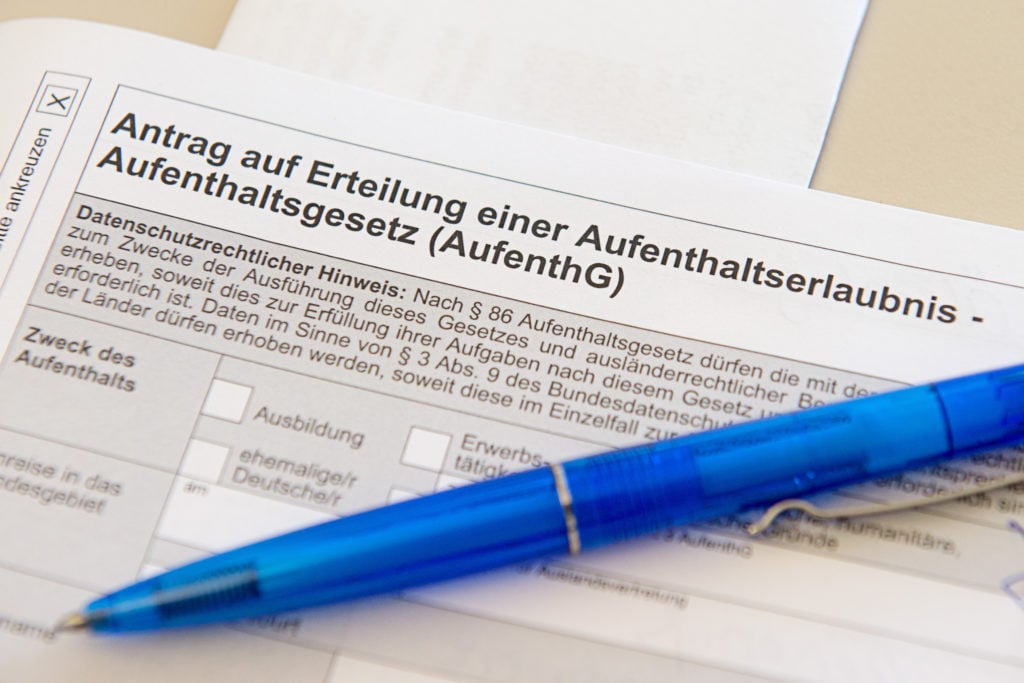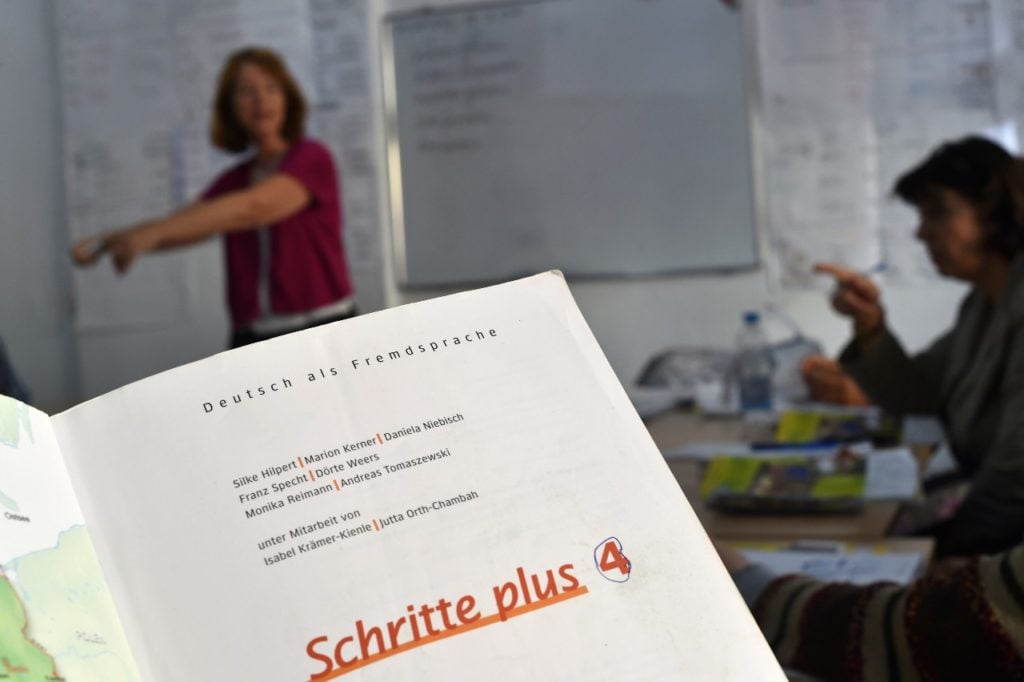EXPLAINED: How to speed up your German citizenship application

The process for becoming a German citizen can take several years, and while there may be no official shortcuts, there are some things you can do to make sure your application is processed as quickly as possible.
Make sure you go to the right Einbürgerungsamt
You may think that any naturalisation office will process citizenship applications.
Think again. If that was the case, the current delays to citizenship applications would be more evenly spread out throughout the country. Instead, waiting times can vary between six months to three years depending on where you live.
READ ALSO: Where in Germany citizenship applications are processed the quickest (and slowest)
Budding German citizens must go to their local naturalisation office, which is why big cities have particularly high numbers of applicants.
But, in some places - especially in big cities - it might not always be obvious which Einbürgerungsamt is responsible for you.
One blogger from Berlin reported in Red Tape Translation:
“I, for example, live on the border of Pankow/Wedding so presumed my office would be in Wedding, but then I found out that Wedding is actually handled in Mitte – who knew?!“
So, make sure you check which office is responsible for you. The important thing is: don’t guess.
Don’t wait to get the necessary documents
While the documents you need to apply for citizenship will, to some extent, depend on your individual case, there are several documents which everyone needs, and you can start preparing these now.
One reader told us on Facebook: “I had everything ready by the time of my Beratung (advice appointment) and could send all documents in the next few days. This won’t make my processing time faster I guess, but it delegates all responsibility to the state since I’ve done my part in advance.”

Application form for a residence permit. Photo: picture alliance / dpa | Wolfram Kastl
You will certainly need to provide copies of your birth certificate and, if applicable, your marriage certificate, as well as your university certificates. These will need to be translated into German by an officially recognised translator. So, to speed up the process you can get these translated way before your first appointment.
You can find approved translators on the national database of approved translators who will provide you with German versions of your documents and their official stamp.
Book your citizenship test early
One of the other key documents you’ll need is a certificate confirming you’ve passed the German citizenship test. Sometimes, you might have to wait months for a test slot, so it’s a good idea to sign up for one as soon as you can.
READ ALSO: TEST: Could you pass the German citizenship exam?
You can find a list of testing centres in your state in the “Downloads” section of the Federal Office for Migration and Refugees, here.
Most local authorities say that you will get the results of the test back within four to six weeks, but this can be much longer.
One reader in Nuremberg recently contacted The Local to tell us that she was still waiting for her results after four months.
Brush up on your language skills
To become a German citizen, you need to be able to speak German to some level. Currently, those who have lived in Germany for eight years have to have a B1 language level, and those applying for fast-track citizenship (six years) have to pass a B2 test.
The proposed changes to the law, however, will offer even faster citizenship after just three years for those who, amongst other things, can pass a C1 exam.

A textbook for learning German as a foreign language. Photo: picture alliance / dpa | Jens Kalaene
Under the new law, everyone except people aged 67 or older who have legally lived in Germany for at least five years, will still have to provide a certificate demonstrating the required language level for their application.
So it's a good idea to get going on preparing for the exam you will need to take as soon as possible. That doesn't just mean breaking out the grammar books, but also booking the test in advance, too, as there are often long waiting times for test appointments and it can take a couple of months for test results to come back.
READ ALSO: How hard is the C1 language test for Germany’s upcoming fast-track citizenship?
Generally, citizenship applicants must have a language certificate from Telc or the Goethe Institut and you can easily find out where you can take a test in your local area by searching your required language level, testing board, location and the word Prüfung (test) e.g. "B2 Telc Prüfung Stuttgart".
Test appointments at Volkshochschulen (people's high schools) tend to be slightly cheaper than in private language schools and therefore harder to come by: another reason why booking in advance is a good idea.
Keep up to date with changes to citizenship law
If you’re a regular reader of The Local, this one shouldn’t be a problem, as we’ve been reporting for some time now about the proposed changes to German citizenship law and will continue to do so.
READ ALSO: KEY POINTS: What’s in Germany’s draft law on dual citizenship?
It’s important to keep up with what’s changing as this could really affect how long you have to wait to apply for citizenship and also the criteria you need to satisfy to become German.
For example, under the current law, citizenship applicants must have at least eight continuous years of residency in Germany to apply for citizenship, though people who speak good German or who can prove "exceptional" integration can apply after six.
In the future, the 'standard' period of required residence will be cut to five years, while the fast-track timeframe will be cut from six to three years for those who fulfil the stricter criteria - such as having C1 language skills.
Get some advice
If you are having trouble with the application process, or if you have any questions about the process, it may be helpful to consult with a lawyer who specializes in citizenship law. Though engaging a lawyer can be costly, having a legal expert on your side will not only make sure you don't overlook anything but can also help expedite the whole process.
READ ALSO: How foreigners can get fast-track citizenship in Germany
If you can't afford a lawyer, there are other services available for foreign nationals trying to become German citizens. Diakonie Deutschland, for example, offers free consultations for those in need of help with the application process.
Keep in touch with the authorities
With more and more people applying for German citizenship, many naturalisation offices are very busy, and your application may end up slipping down the pile. Don't be afraid to chase up your caseworker if you haven't heard anything for a while.
Comments
See Also
Make sure you go to the right Einbürgerungsamt
You may think that any naturalisation office will process citizenship applications.
Think again. If that was the case, the current delays to citizenship applications would be more evenly spread out throughout the country. Instead, waiting times can vary between six months to three years depending on where you live.
READ ALSO: Where in Germany citizenship applications are processed the quickest (and slowest)
Budding German citizens must go to their local naturalisation office, which is why big cities have particularly high numbers of applicants.
But, in some places - especially in big cities - it might not always be obvious which Einbürgerungsamt is responsible for you.
One blogger from Berlin reported in Red Tape Translation:
“I, for example, live on the border of Pankow/Wedding so presumed my office would be in Wedding, but then I found out that Wedding is actually handled in Mitte – who knew?!“
So, make sure you check which office is responsible for you. The important thing is: don’t guess.
Don’t wait to get the necessary documents
While the documents you need to apply for citizenship will, to some extent, depend on your individual case, there are several documents which everyone needs, and you can start preparing these now.
One reader told us on Facebook: “I had everything ready by the time of my Beratung (advice appointment) and could send all documents in the next few days. This won’t make my processing time faster I guess, but it delegates all responsibility to the state since I’ve done my part in advance.”

You will certainly need to provide copies of your birth certificate and, if applicable, your marriage certificate, as well as your university certificates. These will need to be translated into German by an officially recognised translator. So, to speed up the process you can get these translated way before your first appointment.
You can find approved translators on the national database of approved translators who will provide you with German versions of your documents and their official stamp.
Book your citizenship test early
One of the other key documents you’ll need is a certificate confirming you’ve passed the German citizenship test. Sometimes, you might have to wait months for a test slot, so it’s a good idea to sign up for one as soon as you can.
READ ALSO: TEST: Could you pass the German citizenship exam?
You can find a list of testing centres in your state in the “Downloads” section of the Federal Office for Migration and Refugees, here.
Most local authorities say that you will get the results of the test back within four to six weeks, but this can be much longer.
One reader in Nuremberg recently contacted The Local to tell us that she was still waiting for her results after four months.
Brush up on your language skills
To become a German citizen, you need to be able to speak German to some level. Currently, those who have lived in Germany for eight years have to have a B1 language level, and those applying for fast-track citizenship (six years) have to pass a B2 test.
The proposed changes to the law, however, will offer even faster citizenship after just three years for those who, amongst other things, can pass a C1 exam.

Under the new law, everyone except people aged 67 or older who have legally lived in Germany for at least five years, will still have to provide a certificate demonstrating the required language level for their application.
So it's a good idea to get going on preparing for the exam you will need to take as soon as possible. That doesn't just mean breaking out the grammar books, but also booking the test in advance, too, as there are often long waiting times for test appointments and it can take a couple of months for test results to come back.
READ ALSO: How hard is the C1 language test for Germany’s upcoming fast-track citizenship?
Generally, citizenship applicants must have a language certificate from Telc or the Goethe Institut and you can easily find out where you can take a test in your local area by searching your required language level, testing board, location and the word Prüfung (test) e.g. "B2 Telc Prüfung Stuttgart".
Test appointments at Volkshochschulen (people's high schools) tend to be slightly cheaper than in private language schools and therefore harder to come by: another reason why booking in advance is a good idea.
Keep up to date with changes to citizenship law
If you’re a regular reader of The Local, this one shouldn’t be a problem, as we’ve been reporting for some time now about the proposed changes to German citizenship law and will continue to do so.
READ ALSO: KEY POINTS: What’s in Germany’s draft law on dual citizenship?
It’s important to keep up with what’s changing as this could really affect how long you have to wait to apply for citizenship and also the criteria you need to satisfy to become German.
For example, under the current law, citizenship applicants must have at least eight continuous years of residency in Germany to apply for citizenship, though people who speak good German or who can prove "exceptional" integration can apply after six.
In the future, the 'standard' period of required residence will be cut to five years, while the fast-track timeframe will be cut from six to three years for those who fulfil the stricter criteria - such as having C1 language skills.
Get some advice
If you are having trouble with the application process, or if you have any questions about the process, it may be helpful to consult with a lawyer who specializes in citizenship law. Though engaging a lawyer can be costly, having a legal expert on your side will not only make sure you don't overlook anything but can also help expedite the whole process.
READ ALSO: How foreigners can get fast-track citizenship in Germany
If you can't afford a lawyer, there are other services available for foreign nationals trying to become German citizens. Diakonie Deutschland, for example, offers free consultations for those in need of help with the application process.
Keep in touch with the authorities
With more and more people applying for German citizenship, many naturalisation offices are very busy, and your application may end up slipping down the pile. Don't be afraid to chase up your caseworker if you haven't heard anything for a while.
Join the conversation in our comments section below. Share your own views and experience and if you have a question or suggestion for our journalists then email us at [email protected].
Please keep comments civil, constructive and on topic – and make sure to read our terms of use before getting involved.
Please log in here to leave a comment.